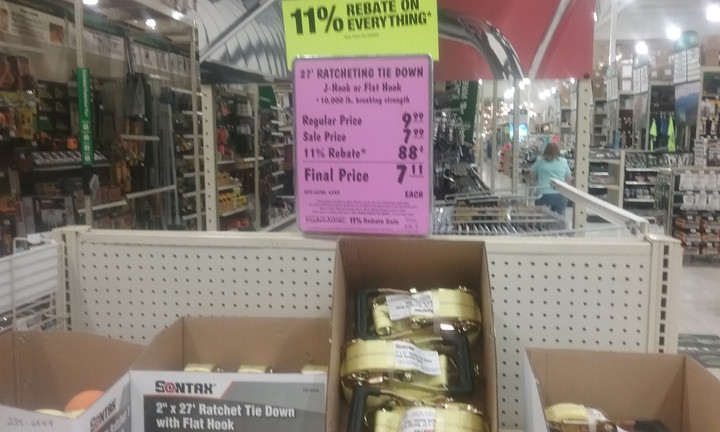You should upgrade or use an alternative browser.
- Thread starter Geo-TH,In
- Start date
Also, the rated load capacity is going to go down with age, the way the straps are stored and they way the straps are used.
john in la
Well-known Member
WLL can be no more than 1/3 of breaking strength so those straps are good for 3333lbs max.
May even be less depending on the ratchet part.
If that paper tag ever falls off they are only good for 2000lbs because there is no way to prove how strong they are.
Second straps are good tie downs.
Problem is most people want to wrap the strap over or around metal parts.
This causes abrasion possibilities at the point they both meet.
You can use abrasion point preventers but most people do not take this extra step.
But that is a good price for that size strap.
Bryce Frazier
Well-known Member
LOVE them for Hay, restored things, wood, etc. Anything that you need the wider surface area / contact point, and don't want to scratch up, or tear ruts in with a chain. . . . .
Great for somethings, not so for others!
gene bender
Well-known Member
old
Well-known Member
- Location
- Camdenton Missouri
Geo-TH,In
Well-known Member
BTW, please post a link to how loads are to be properly chained. I don't have a need for a CDL. I've never been stopped either, I'm 67 too. Never read how do to things the legal way either. I just use common sense and a little physics when I strap my loads. Never lost a load either. geo
old
Well-known Member
- Location
- Camdenton Missouri
john in la
Well-known Member
How or When straps do not DOT standards.
And under what conditions a passenger can get a ticket for the operation of a vehicle.
Brendon-KS
Well-known Member
- Location
- Goessel, KS
DOT Cargo Securement Rules
old
Well-known Member
- Location
- Camdenton Missouri
Geo-TH,In
Well-known Member
Cargo Securement Rules
Background
On September 27, 2002, the Federal Motor Carrier Safety Administration (FMCSA) published new cargo securement rules. Motor carriers operating in interstate commerce must comply with the new requirements beginning January 1, 2004.
Notice the key words, Motor carriers operating in interstate commerce must comply.
SOOOOOOOOOOOOO if I'm not a motor carrier and I'm not operating in interstate commerce, Does any of this really apply to an individual towing his tractor form one property to another using back roads and city street?
Perhaps this is why I never see cops stopping people for not having backhoes tied down on a trailer?
Would someone post a link for securing loads for an individual that is not operating in interstate commerce?
geo.
T in NE
Well-known Member
- Location
- Cambridge, Nebraska
T in NE
Well-known Member
- Location
- Cambridge, Nebraska
Geo-TH,In
Well-known Member
TOTALLY AGREE, When you roll out unto the road be it county, state or interstate you are responsible for that load and makes no difference if your transporting your private items or your a commercial carrier. In Indiana we are required to have insurance too. I can see where I can and should get a ticket if something falls off my truck or trailer, that's common sense.
Would someone please post a link describing how we are to secure our loads if we are transporting private items. In the past some have said we can't use rub rails and stake pockets. I would like to see proper and safe procedures in writing.
FYI, I use 2 chains and 6 straps to secure my loads. I have attached chains on both ends of straps so the strap can't get damaged rubbing against any metal.
geo.
Stephen Newell
Well-known Member
Stephen Newell
Well-known Member
old
Well-known Member
- Location
- Camdenton Missouri
john in la
Well-known Member
You are driving and I am a passenger.
You are speeding.
I know you are speeding.
So the cop can write a ticket to both of us because you were speeding?
You do not really believe that do you?
buickanddeere
Well-known Member
I wonder what would happen if they were used to hoist a 5 ton load ?
old
Well-known Member
- Location
- Camdenton Missouri
Similar threads
- Replies
- 18
- Views
- 932
We sell tractor parts! We have the parts you need to repair your tractor - the right parts. Our low prices and years of research make us your best choice when you need parts. Shop Online Today.
Copyright © 1997-2024 Yesterday's Tractor Co.
All Rights Reserved. Reproduction of any part of this website, including design and content, without written permission is strictly prohibited. Trade Marks and Trade Names contained and used in this Website are those of others, and are used in this Website in a descriptive sense to refer to the products of others. Use of this Web site constitutes acceptance of our User Agreement and Privacy Policy TRADEMARK DISCLAIMER: Tradenames and Trademarks referred to within Yesterday's Tractor Co. products and within the Yesterday's Tractor Co. websites are the property of their respective trademark holders. None of these trademark holders are affiliated with Yesterday's Tractor Co., our products, or our website nor are we sponsored by them. John Deere and its logos are the registered trademarks of the John Deere Corporation. Agco, Agco Allis, White, Massey Ferguson and their logos are the registered trademarks of AGCO Corporation. Case, Case-IH, Farmall, International Harvester, New Holland and their logos are registered trademarks of CNH Global N.V.
Yesterday's Tractors - Antique Tractor Headquarters
Website Accessibility Policy


